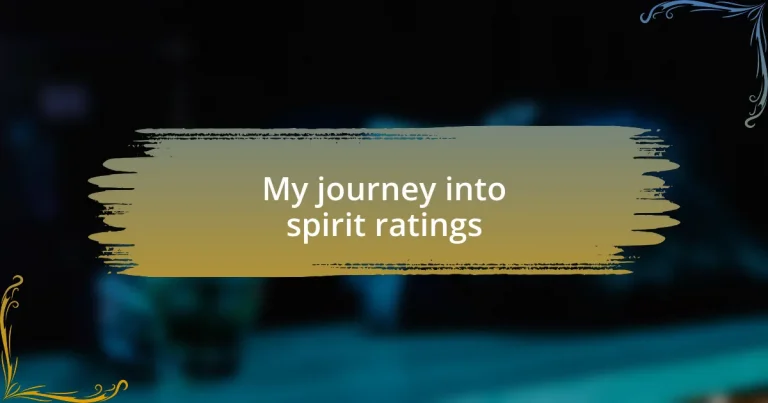Key takeaways:
- Spirit ratings encapsulate taste, aroma, and personal stories, emphasizing the subjective nature of individual preferences.
- Alcohol reviews provide valuable guidance, fostering community and connection among enthusiasts through shared experiences.
- Different types of spirits, like whiskey, vodka, and rum, offer unique tasting characteristics shaped by their production methods.
- Open-mindedness in tasting can lead to delightful discoveries, highlighting the importance of understanding the stories behind each spirit.
Author: Clara Whitmore
Bio: Clara Whitmore is an acclaimed author and storyteller known for her captivating narratives and richly drawn characters. Her work spans several genres, including contemporary fiction and historical romance, often weaving elements of personal experience into her writing. Clara holds a Master’s degree in Creative Writing from the University of Edinburgh and has published three novels, which have garnered critical acclaim and a loyal readership. When she’s not writing, Clara enjoys exploring quaint bookstores and hosting literary workshops. She currently resides in Portland, Oregon, with her dog, Jasper.
Understanding spirit ratings
When diving into spirit ratings, I often find myself reflecting on the sheer variety of alcohol available, each with a unique profile. It’s fascinating how a simple number or star rating can encapsulate the qualities of a drink. Have you ever found yourself standing in front of a shelf, puzzled by the ratings? I know I have, and it can sometimes feel overwhelming.
In my journey, I’ve learned that spirit ratings are not just arbitrary numbers; they reflect a combination of taste, aroma, and even the story behind the spirit. For instance, when I first tried a high-rated bourbon, the warmth and complexity surprised me. How can one bottle evoke such different experiences? It’s all about how flavors interact with our palate and emotions, creating a personal connection to what we drink.
There are times when I question the subjectivity of ratings. What resonates with one person might not with another. I remember a whiskey that garnered rave reviews, yet its peaty flavor left me scratching my head. In my exploration, I’ve come to appreciate that these ratings can guide us, but ultimately, they should complement our own tastes and discoveries in the world of spirits.
Importance of alcohol reviews
When it comes to alcohol reviews, I’ve discovered they serve as a crucial roadmap for enthusiasts and newcomers alike. Imagine being at a bustling bar or a cozy liquor store surrounded by countless bottles. Without reviews, picking a spirit can feel like a gamble. I remember my first time ordering tequila; the bartender recommended a particular brand based on its rave reviews, and that night, I truly understood the magic of choosing wisely.
Reviews aren’t just numbers; they carry the weight of personal stories and experiences. I once stumbled upon a gin praised for its botanical complexity and floral notes. After trying it, I couldn’t help but appreciate how the reviewer captured its essence so vividly. It felt as though I was sharing that drink with them, each sip allowing me to connect with their experience. It reinforces my belief that a review can evoke those emotions and bring the drink’s journey to life, sparking curiosity in the reader.
Additionally, I find that alcohol reviews foster a sense of community among drinkers. Whether we’re sharing our latest finds at a gathering or discussing a craft vodka online, those reviews start conversations. It’s not just about tasting; it’s about connecting over experiences and expanding our horizons. Have you ever bonded over a mutual favorite whiskey? Those moments remind me why reviews matter—they transform individual tasting experiences into collective memories we can cherish together.
Different types of spirits
Spirits come in various types, each with its unique characteristics and production methods. For instance, whiskey has a rich history and can be made from grains like barley, corn, and rye, offering a complex taste profile that varies significantly depending on aging. I remember the first time I savored a bourbon that had notes of caramel and vanilla; it opened my eyes to how different ingredients and processes can create a truly unique experience.
Then there’s vodka, known for its purity and versatility, often distilled multiple times to achieve that smooth finish. I once hosted a cocktail night and experimented with different vodka brands; the difference was astonishing. Some were crisp and clean, while others had a subtle flavor profile that made each cocktail feel special. It really got me thinking about how often people overlook vodka when discussing spirits.
And we can’t forget about rum, which carries the spirit of tropical islands. My first taste of dark rum was an eye-opener — the molasses and spice notes gave me a sense of warmth and adventure. It made me wonder how many fantastic experiences are locked within each bottle, waiting for the right moment to be uncorked and shared. Each type of spirit tells its own story, inviting us to explore and savor the journey.
Basics of evaluating spirits
When evaluating spirits, the first aspect I focus on is their appearance. A clear, vibrant look can indicate quality; for instance, I once poured a gin that shimmered beautifully in the glass. The lively hues made me eager to take that first sip, reminding me how visual elements can set the stage for the tasting experience.
Next, I engage with the aroma, which can be quite revealing. The first time I lifted the glass to my nose and inhaled the rich bouquet of a fine rum, I felt transported to a distant tropical island. Isn’t it fascinating how a single inhalation can evoke such vivid memories? The aroma not only prepares the palate but can also hint at the spirit’s complexity and character.
Lastly, the tasting itself is where everything comes together. I remember trying a single malt whisky, and the layers of flavor hit my tongue in waves — from fruity notes to a warm smokiness. How often do we rush through this part? I’ve learned that taking a moment to appreciate the finish can unveil hidden depths that transform an ordinary sip into an extraordinary experience.
My personal rating criteria
When it comes to my personal rating criteria, I often start with the initial impression that a spirit leaves on me. I distinctly remember the first time I encountered an aged bourbon; the rich caramel notes were almost like a warm hug. That sense of familiarity and comfort plays a crucial role in my overall assessment. Do you ever find yourself drawn to certain flavors based on personal memories?
The texture of a spirit also significantly influences my ratings. I once sipped a velvety smooth rum that glided effortlessly over my palate, a stark contrast to some harsher spirits I’d tried before. This tactile experience can elevate a good drink to something truly special. I often ask myself: can I envision this spirit as part of a relaxing evening or a celebratory toast?
Lastly, the value for money aspect cannot be ignored in my personal criteria. I think back to a gin that surprised me with its quality while being relatively affordable. It made me realize that excellent spirits don’t always have to come with a hefty price tag. This insight not only shapes my recommendations but also encourages a broader appreciation for the diverse range of options available.
Highlights from my tasting experiences
One highlight from my tasting experiences was when I tried an artisanal gin for the first time. The blend of botanicals created a symphony of flavors I hadn’t expected, and the moment I took that first sip, I felt an exhilarating surprise wash over me. Have you ever tasted something that instantly changed your perception of what it could be?
Another memorable experience unfolded during a whiskey tasting event I attended. I distinctly recall a particular single malt that delivered complex layers of dried fruit and smokiness. As I closed my eyes, I could almost hear the crackling of the campfire in the background. It was as if that spirit transported me to another world, which left me pondering: isn’t that the power of truly exceptional spirits?
Recently, I savored a mezcal that was unlike any other I had tried. The smoky character danced beautifully with hints of citrus, and I found myself captivated by its boldness. It made me realize how deeply a spirit can resonate with one’s personal journey. Have you ever experienced a drink that felt like a reflection of your own story?
Lessons learned on my journey
One significant lesson I learned is the importance of being open-minded when it comes to tasting spirits. I remember a time when I approached a vodka tasting with skepticism, convinced that it was just a neutral spirit. However, I was surprised by the distinctive flavors present in crafted vodkas from different regions. This experience taught me that sometimes, setting aside preconceived notions can lead to delightful discoveries. Have you ever realized that your expectations could limit your experiences?
Another lesson revolves around the stories behind the spirits. During a recent visit to a distillery, I was captivated by the narrative of how a family-run operation infused their values into their products. It struck me that each bottle carries not just a flavor but also a history and a passion. This made me wonder: how much richer would our drinking experiences be if we appreciated the journeys behind what we consume?
Lastly, I learned about the value of community in the world of spirits. Participating in tasting events introduced me to a diverse group of enthusiasts, each with unique insights and preferences. One evening, a fellow enthusiast shared how a specific bourbon represented a cherished memory from his childhood. This connection reminded me that spirits often serve as a bridge between experiences and emotions. Have you found that sharing a drink can spark meaningful conversations?


